Nakijin Castle
-Magnificent castle of northern kingdom of Okinawa island-
Overview
Name: Nakijin castle (Nakijin-jo)Alias:
Place: Imatomari Nakijin village, Okinawa
Location: 26.69123482466998, 127.92911294899943
Type: Hill castle
Built: 13th century
Remaining remnants: Stone walls
Title: World heritage (collectively with other Okinawa castles), 100 famous Japanese castles
Nakijin castle (今帰仁城) is located on a hill looking down the East China sea in Nakijin village, at the north shore of Honbu peninsula. Nakijin area is plain area rarely in northern half of Okinawa island, along with Nago area at opposite side of Honbu peninsula. Nakijin castle was a residence of Hokuzan kingdom (northern kingdom) at the era of three kingdoms around 14th century.
Unlike mainland of Japan, there had not been in a centralized authority in Okinawa island until 10th century. But among the rise of naval trade of Chinese Sung dynasty since 11th century and arrival of rice cultivation, local lords called as Azi gradually grew their power and expand their territory. As these small lords lived as castles named as "gusuku", this period is called as "Gusuku Era".
By the mid of 14th century, among the centralization of authority there arose three kingdoms at the north, middle and south part of Okinawa island. Northern kingdom called as was established by Hanishi and called as Hokuzan kingdom. They resided at Nakijin castle and governed held northern territory of island upper from the bottle neck of Chatan town. Its territory was the largest of three kingdoms, but most part of territory was mountainous area, thus production capacity of kingdom was the lowest. But Hokuzan kingdom was military strong.
The middle kingdom called as Chuzan kingdom, grew from medieval monarchy built by King Eiso in 13th century and changed to Satudo dynasty at middle of 14th century. They resided at Urasoe castle (Urasoe city) or Nanzan castle (and governed middle area of island from Noha river to neck of Chatan.
Chuzan kingdom had a good port and aggressively trade and communicate with Chinese dynasties, and along with achieved wealth and technology it became the strongest of the three. Later Sho Ha Shi (1372-1439) seized Chuzan Kingdom and established Sho dynasty in 1406, then united whole island using as this area as foothold and built Ryukyu kingdom.
The southern kingdom called as Nanzan Kingdom was founded by Sho clan at the beginning of 14th century. They resided at Osato castle (Nanjo city) or Nanzan castle (Itoman city), and governed southern part of island. Although its authority was unstable, the southern kingdom seized agricultural areas of the southern part of the island and had many populations. It also traded with China along with Chuzan Kingdom.
Nakijin castle was built as a residence northern kingdom in 13th century. This castle locates on the isosceles triangle shaped hill of 100 meter height, being surrounded by two deep valleys and spreads from hilltop toward north. Nakijin castle roughly consist of three layers of terrace built on the north slope of the hill.
Central area of the castle is roughly square shaped area of 50 meter long, and there might be the palace of the king. The basement of main building remains at eastern edge, and backside gate with guarding watchtower is built at southwestern corner.
Type: Hill castle
Built: 13th century
Remaining remnants: Stone walls
Title: World heritage (collectively with other Okinawa castles), 100 famous Japanese castles
Brief History
Nakijin castle (今帰仁城) is located on a hill looking down the East China sea in Nakijin village, at the north shore of Honbu peninsula. Nakijin area is plain area rarely in northern half of Okinawa island, along with Nago area at opposite side of Honbu peninsula. Nakijin castle was a residence of Hokuzan kingdom (northern kingdom) at the era of three kingdoms around 14th century.
Unlike mainland of Japan, there had not been in a centralized authority in Okinawa island until 10th century. But among the rise of naval trade of Chinese Sung dynasty since 11th century and arrival of rice cultivation, local lords called as Azi gradually grew their power and expand their territory. As these small lords lived as castles named as "gusuku", this period is called as "Gusuku Era".
Three Kingdom era of Okinawa island
By the mid of 14th century, among the centralization of authority there arose three kingdoms at the north, middle and south part of Okinawa island. Northern kingdom called as was established by Hanishi and called as Hokuzan kingdom. They resided at Nakijin castle and governed held northern territory of island upper from the bottle neck of Chatan town. Its territory was the largest of three kingdoms, but most part of territory was mountainous area, thus production capacity of kingdom was the lowest. But Hokuzan kingdom was military strong.
The middle kingdom called as Chuzan kingdom, grew from medieval monarchy built by King Eiso in 13th century and changed to Satudo dynasty at middle of 14th century. They resided at Urasoe castle (Urasoe city) or Nanzan castle (and governed middle area of island from Noha river to neck of Chatan.
Chuzan kingdom had a good port and aggressively trade and communicate with Chinese dynasties, and along with achieved wealth and technology it became the strongest of the three. Later Sho Ha Shi (1372-1439) seized Chuzan Kingdom and established Sho dynasty in 1406, then united whole island using as this area as foothold and built Ryukyu kingdom.
The southern kingdom called as Nanzan Kingdom was founded by Sho clan at the beginning of 14th century. They resided at Osato castle (Nanjo city) or Nanzan castle (Itoman city), and governed southern part of island. Although its authority was unstable, the southern kingdom seized agricultural areas of the southern part of the island and had many populations. It also traded with China along with Chuzan Kingdom.
Structure of Nakijin Castle
Nakijin castle was built as a residence northern kingdom in 13th century. This castle locates on the isosceles triangle shaped hill of 100 meter height, being surrounded by two deep valleys and spreads from hilltop toward north. Nakijin castle roughly consist of three layers of terrace built on the north slope of the hill.
Central area of the castle is roughly square shaped area of 50 meter long, and there might be the palace of the king. The basement of main building remains at eastern edge, and backside gate with guarding watchtower is built at southwestern corner.
Ahead of this backside gate, the slope goes down to Shigemajyokaku Area, the most inner part of the castle facing sheer cliff. This area might be used by relative of the king, and trace of several buildings are found. In front of central area, Uchibaru area which was the sacred place where priestess lived and Umya area existed at hilltop area.
At the halfway of the hill, Usimi area spreads east half of the slope. This area is used as a residence and training space of soldiers, and protected by tall and winding stone walls. Most frequently used picture of Nakijin castle is the wall and tower of this Usimi area, but now this area is off limit became of investigation. Aside of this Usimi area, a long climbing road from hillside area to hilltop area runs over 200 meter long. Main entrance of the castle at the below of this main route was renovated, with square shaped stone arch and two spaces of guardian.
Hillside outer area is a large area of about 100 meter long and 50 meter wide and was protected by low stone walls, but good part of stone wall was lost. There is a large stone pavement and might be used as a residence of king and other important retainers. At the north of there castle there might be a castle town, and ruin of old village still remain around the castle.
In 1416, Sho Ha Shi defeated Hokusan kingdom in alliance with local lords of northern area who had antipathy to kingdom. It is said that Gosamaru (?-1458) who was originally a descendant of Nakijin lord but was expelled and served for Sho Hashi attacked Nakijin castle and fell it.
After the fall Nakijin castle had been used as a northern base of Ryukyu kingdom, but iafter 16th century it was abandoned. Later the site of castle has been used as a religious space, and even now this place is one of the site of pilgrim for local people. As this area was apart from battlefield of WW2 and development, Nakijin castle considerably kept its original walls until now. Beautifully curved magnificent stone walls and large flat area shows it was surely a main base of Hokuzan kingdom in the past.
60 minutes drive from Okinawa Jidoshado Expressway Kyoda interchange via Route 58 and Route 505.
Shuri Castle -400 year capital of southern island kingdom-
Nakagusuku Castle -Last and strongest medieval fortress in Okinawa-
Katsuren Castle -Castle of talented lord who aimed at whole Okinawa island-
At the halfway of the hill, Usimi area spreads east half of the slope. This area is used as a residence and training space of soldiers, and protected by tall and winding stone walls. Most frequently used picture of Nakijin castle is the wall and tower of this Usimi area, but now this area is off limit became of investigation. Aside of this Usimi area, a long climbing road from hillside area to hilltop area runs over 200 meter long. Main entrance of the castle at the below of this main route was renovated, with square shaped stone arch and two spaces of guardian.
Hillside outer area is a large area of about 100 meter long and 50 meter wide and was protected by low stone walls, but good part of stone wall was lost. There is a large stone pavement and might be used as a residence of king and other important retainers. At the north of there castle there might be a castle town, and ruin of old village still remain around the castle.
End of Hokuzan Kingdom and Nakijin castle
In 1416, Sho Ha Shi defeated Hokusan kingdom in alliance with local lords of northern area who had antipathy to kingdom. It is said that Gosamaru (?-1458) who was originally a descendant of Nakijin lord but was expelled and served for Sho Hashi attacked Nakijin castle and fell it.
After the fall Nakijin castle had been used as a northern base of Ryukyu kingdom, but iafter 16th century it was abandoned. Later the site of castle has been used as a religious space, and even now this place is one of the site of pilgrim for local people. As this area was apart from battlefield of WW2 and development, Nakijin castle considerably kept its original walls until now. Beautifully curved magnificent stone walls and large flat area shows it was surely a main base of Hokuzan kingdom in the past.
Access
60 minutes drive from Okinawa Jidoshado Expressway Kyoda interchange via Route 58 and Route 505.
Related Castles
Shuri Castle -400 year capital of southern island kingdom-
Nakagusuku Castle -Last and strongest medieval fortress in Okinawa-
Katsuren Castle -Castle of talented lord who aimed at whole Okinawa island-
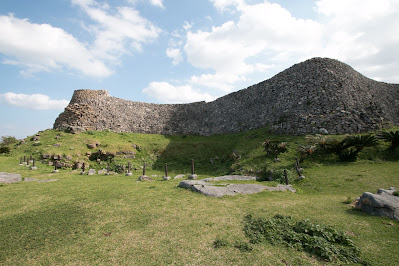

























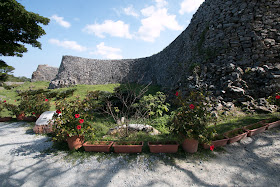

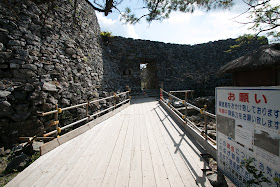






















































































































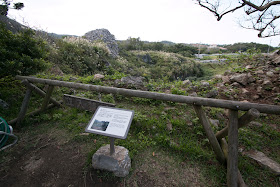










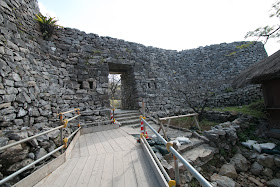






























No comments:
Post a Comment